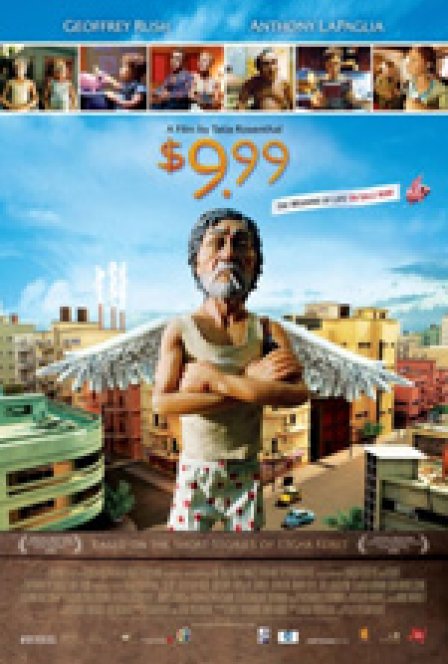$9.99 is the third collaboration between New York stop-motion animation whiz Tatia Rosenthal and Israeli literary darling Etgar Keret. Rosenthal's highly stylized and sometimes awe-inspiring visuals are without a doubt a wonder to behold. But although her techniques are praiseworthy, they leave the audience wondering if the story she’s trying to tell is worth the painstaking work required to make it look so super-awesome.
The feature grew out of a short film (A Buck’s Worth) that Rosenthal adapted from one of Keret’s stories. In the short, a homeless man approaches a businessman waiting for a cab ride to a job we can only assume is meaningless. He attempts to bum a cigarette and panhandle enough money to buy a cup of coffee. When the businessman clams up, the homeless guy eventually takes his own life with a gun he found in the alley. Rosenthal’s short film is a brilliantly executed study of human nature, and, after the warm reception it garnered on the festival circuit, Rosenthal and Keret saw the potential to make what eventually became $9.99.
This feature animated film boasts a story that is as multi-faceted as it is intriguing. The action centers on four main characters who all live in the same high-rise apartment complex in an unnamed Australian metropolis. Dave Peck (Samuel Johnson), a 28-year-old perpetually unemployed idealist, lives with his father, Jim (Anthony LaPaglia), in a modest flat. Both seem to be suffering from the anxiety that naturally results from the absence of the Peck family matriarch, who we never hear about, save for the fact that she left them a long time ago. In the course of searching for a source of lasting fulfillment in his life, Dave becomes privy to a book that purports to explain the very meaning of existence. The book is sold through a mail-order catalog for -- you guessed it -- $9.99. Dave spends the rest of the film unsuccessfully trying to read the book to everyone he meets.
As the story unfolds, we become acquainted with a few other occupants of the high-rise, all of whom offer diverse viewpoints on the meaning of life. Lenny Peck, Dave’s only sibling, spends his days working for a repo company, taking the prized possessions of life’s less fortunate for a meager wage. Lenny meets up with a thoroughly vapid supermodel, Michelle (Claudia Karvan), who recently moved into a penthouse suite at the very top of the apartment complex. Other notable characters include a lonely widower who is visited by a sardonic and somewhat insulting guardian angel (Geoffrey Rush), who can find nothing better to do than critique the old man's apartment. Another of Dave's neighbors is an immature slacker who can’t sustain a meaningful relationship with an empowered, professional woman who responds to his predicament by smoking too much pot and drinking himself into a stupor with the aid of three (presumably) imaginary miniature bros who convince him she isn't worth worrying over.
Watching $9.99, I couldn’t help but remember another painfully overdone slice-of-life film, Lawrence Kasdan’s Grand Canyon. Both movies attempt to craft a grandiose allegory to address the mysteries of the universe, and both end up sounding preachy and forced. While Keret and Rosenthal display their estimable talents in $9.99, the various stories that make up the film are just too disjointed to yield a graceful conclusion.

